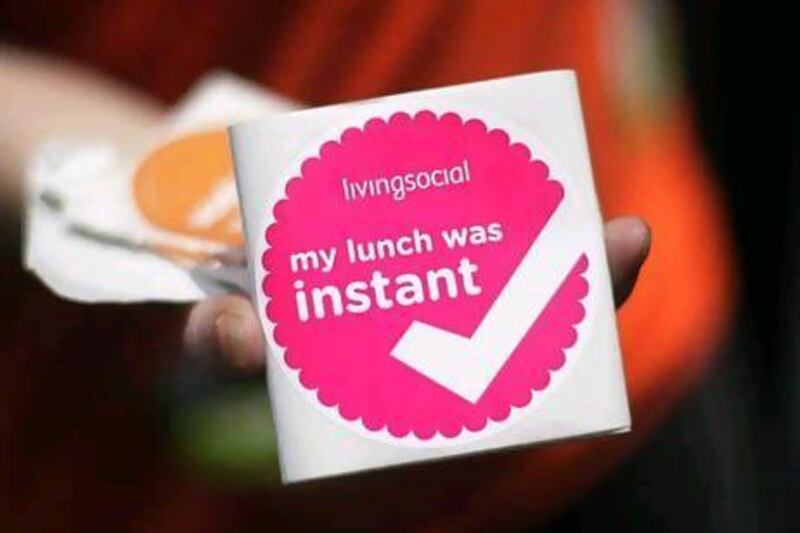It was like they all arrived overnight. One moment no one knew what a group-buying website was, and the next, everyone was availing of discounts on spa treatments, teeth whitening and restaurants.
Having really kicked off at the beginning of last year, the daily deals industry in the UAE now contains more than 20 companies, most of which sport bizarre names such as Moosavings and DealGobbler.
But with the news last week that LivingSocial, a pioneer of the industry and one of the biggest players in the world, was considering leaving the Middle East because its operations were bleeding dirhams, questions are being asked about the sustainability of so many daily deals websites .
"For LivingSocial, with all their resources, tactics, experience and global reach, if they could not break the market, it means the whole sector is in trouble," says Imad Kublawi, the chief executive of IK Consult and a regional partner of Results International, which specialises in mergers and acquisitions in the communications and technology industries. "LivingSocial is a sign for everybody."
The Washington-based website is searching for a buyer for its subscriber base of about 750,000 users in the UAE, Egypt and Lebanon.
If a buyer is not found imminently, the operations are set to close. The business lost more than US$500,000 (Dh1.83 million) in one month alone this year, according to company data.
Analysts say the initial barriers to entry in the market are low as anyone can download the software required to run a website for a few hundred dollars and acquire a database of email addresses.
The industry has grown to such an extent that there are now copycats of copycats.
One website is called Cobones, which sounds a lot like Cobone, one of the market leaders, which might also be confused with Kobonaty, another site.
The original daily deals website in the United States was Groupon, and its UAE operation now competes with the similar sounding Scoupon and Group4deal.
"The short answer is the industry is not sustainable," says Mr Kublawi. "If they all expand to markets like Saudi Arabia, then it's another story, but we have also seen it not working in Egypt."
Industry insiders say that because of the sheer number of players in the market, each site is undercutting the other to win over merchants' business.
Daily deals websites make money by convincing merchants to offer products and services at a discount as a form of marketing to eventually attract loyal customers.
The websites take a commission from the price of the deal and the commissions have slowly grown smaller as more websites join the fray. Industry insiders say the level of commission is now below 10 per cent for many sites, having started out at about 30 per cent.
"Smaller websites are hurting the industry," says Alexander Kappes, the chief executive of Groupon Middle East. "They are engaging in a price war."
Unlike LivingSocial, Groupon Middle East last week said it was profitable in the UAE and Paul Kenny, the chief executive at Cobone, says that his site is doing well since being founded in 2010.
He acknowledges that some daily deals sites have faced problems with the business model, but says Cobone is evolving into a more general e-commerce site.
"Of course, there are challenges with the model. But we have met each challenge along the way," Mr Kenny says. "We've taken steps to evolve the business model to suit the region. And we've done very well from it."
Examples of how the business has evolved include the addition of shopping and travel sections on its website.
Despite this, Mr Kenny says Cobone does not plan to abandon the group-buying model altogether.
"It's always something that we hold very close to our business model. We have a lot of potential with a market that is very much in a growth phase," he says. "For most of the merchants, the first time they interact online with their customers is through Cobone."
Mr Kappes says he expects the number of group-buying websites to be significantly less than 20 by the end of the year as smaller sites go out of business or consolidate.
"At the top, there's only space for two competitors," he says. "If they are happy making the little money they earn, if they make any money … there's no arable land for those companies."
But there are some smaller websites that insist they are profitable businesses because they have managed to acquire a loyal subscriber base without having to spend huge amounts on marketing and search-engine optimization.
Joyoffer, a deals website that focuses more on offering products and services for women, says it has been profitable since February, having begun operations last year.
"We are focusing on being more sustainable because it's not worth it to compete with global giants like LivingSocial and Groupon in terms of ads," says Serhan Erol, managing partner at Joyoffer.
Hermann Behrens, the chief executive of The Brand Union Middle East, a brand and creative design consultancy, agrees that the quality of users on the website makes a difference, because the rate of users converting to purchasers needs to be high.
"You have heard the expression in golf: you drive for show and putt for dough. I think the same applies to group buying and the social networks as they fight for relevance in a world crazy with change and people seeking the next big thing," he says. "The challenge is not to develop a huge database, the challenge is to have that huge database of users actively and regularly utilising the services to realise the volumes that these sites depend on to make the dough. Group-buying sites are going to need to find ways of increasing the active users of their services."
bflanagan@thenational.ae
twitter: Follow and share our breaking business news. Follow us
iPad users can read the digital edition of business section as it was printed via our e-reader app. Click here





